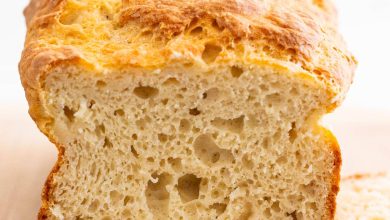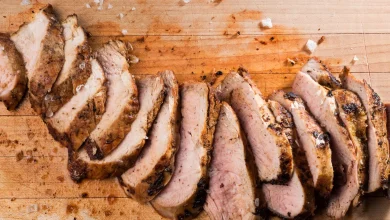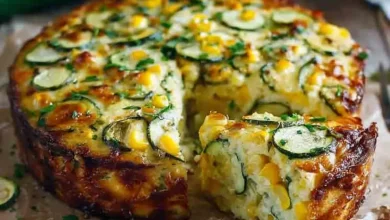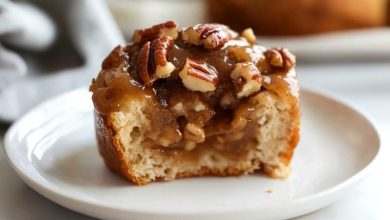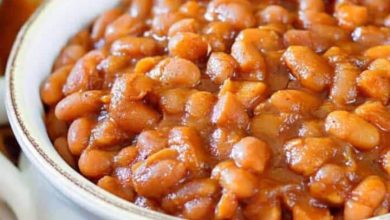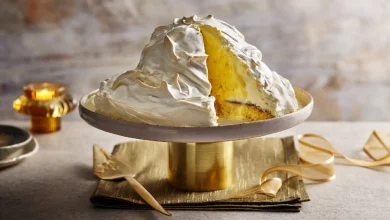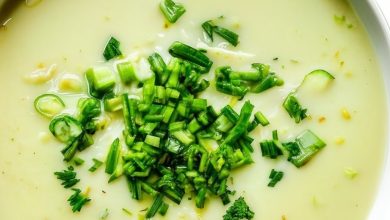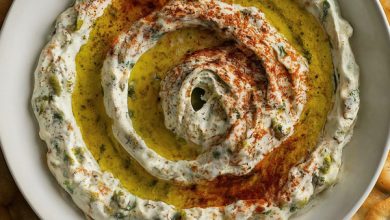Creamy Caviar Tagliatelle with Shrimp and Parmesan
Indulge in the perfect balance of elegance and simplicity with this creamy, luxurious Tagliatelle in a Creamy Caviar Sauce. This recipe combines silky pasta, buttery sauce, and the exquisite touch of black caviar, making it an ideal dish for those special moments when you want to spoil your loved one. Paired with ice-cold Champagne, it transforms any meal into a celebration. Whether it’s a romantic dinner or a special treat, this dish is sure to impress.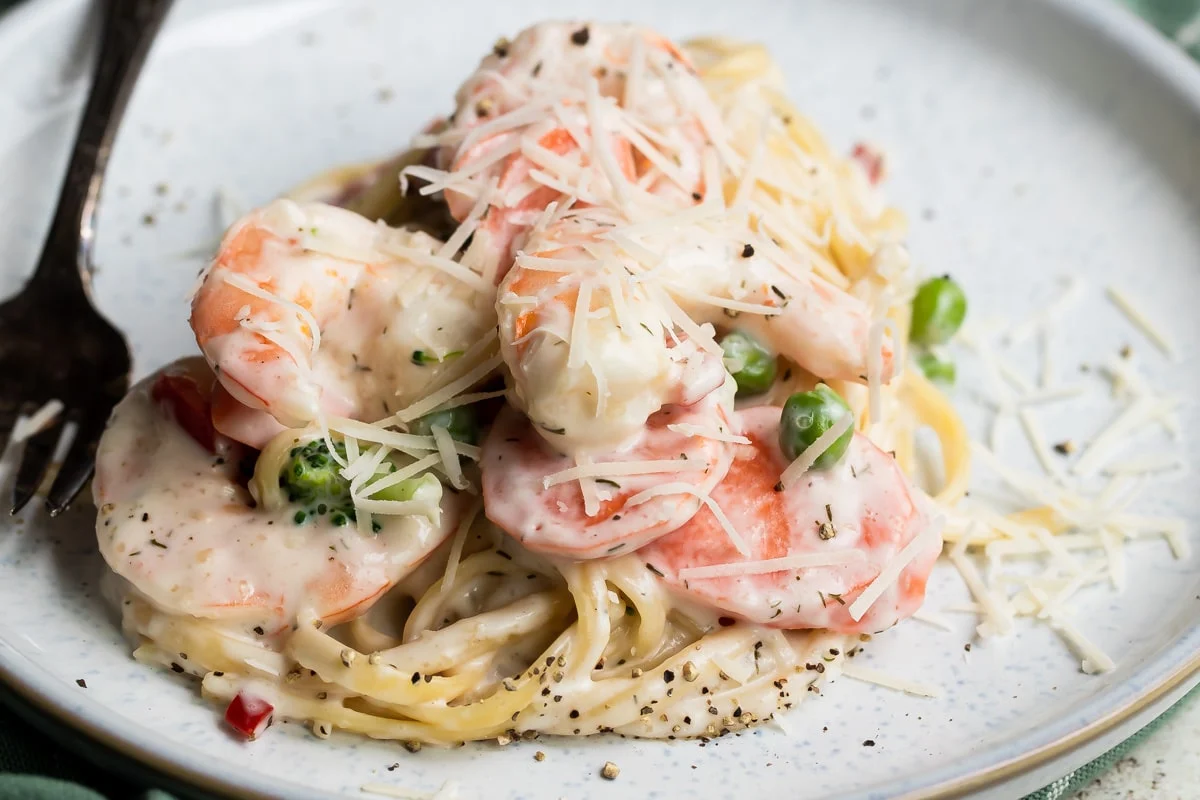
Time
Prep Time: 10 minutes
Cook Time: 10 minutes
Total Time: 20 minutes
Needed Equipment
- Large pot
- Medium-sized skillet
- Colander for draining pasta
- Serving dish
- Measuring cups and spoons
- Wooden spoon or spatula
Tags
<30 Mins, Caviar, Shrimp, Pasta, Luxurious, Elegant
Serving Size
4 servings
Difficulty Level
Medium
Allergen Information
This dish contains shellfish (shrimp), dairy (butter, cream, Parmesan cheese), and fish (caviar). Please ensure to check for any allergies before serving.
Dietary Preference
This recipe is not suitable for strict vegetarian or vegan diets due to the inclusion of shrimp, butter, and caviar. However, it can be adjusted for pescatarians.
Course
Main Course
Cuisine
Italian
Ingredients
| Ingredient | Quantity |
|---|---|
| Tagliatelle pasta noodles | 400 grams |
| Butter | 1/2 cup |
| Black caviar | 1 tablespoon |
| Shrimp or prawns (cooked) | 1/2 – 3/4 cup |
| Fresh ground black pepper | 1 teaspoon (to taste) |
| Parmesan cheese (grated) | 1 tablespoon (to taste) |
Instructions
Prepare the Pasta:
Bring a large pot of salted water to a boil. Add the tagliatelle and cook according to the package instructions until al dente. Once cooked, drain the pasta, reserving a little pasta water, and toss the noodles in a small amount of olive oil to prevent sticking. Place them in a warmed serving dish to keep them hot.
Make the Sauce:
In a medium-sized skillet, melt the butter over medium heat. Once melted, pour in the heavy cream and stir continuously. Allow the mixture to heat up until it just starts to bubble gently, indicating it’s reached a slight boil.
Add the Caviar:
Gently stir in the black caviar, allowing it to incorporate into the creamy sauce. Be careful not to over-mix, as you want to preserve the delicate texture and flavor of the caviar. Heat the sauce for another minute, letting the flavors blend together.
Incorporate the Shrimp:
Add the cooked shrimp or prawns to the skillet, stirring to ensure they are coated in the creamy sauce. Let the mixture heat through for about one minute, ensuring the shrimp are warm and fully immersed in the sauce.
Combine the Pasta and Sauce:
Pour the creamy caviar and shrimp sauce over the prepared tagliatelle pasta. Toss gently, making sure the pasta is well-coated with the rich sauce. If needed, add a small amount of reserved pasta water to adjust the consistency of the sauce to your liking.
Finish the Dish:
Sprinkle freshly ground black pepper over the top of the dish to taste. Add a generous dusting of freshly grated Parmesan cheese for an extra layer of richness and flavor.
Serve and Enjoy:
Serve immediately with a simple green salad on the side. This dish is perfect with a glass of chilled Champagne, bringing a touch of celebration to any evening.
Preparation Tips
- Make sure to prepare all your ingredients before starting the cooking process to keep things organized.
- Use high-quality caviar for the best flavor and experience.
- Keep the pasta warm by covering it with a lid while preparing the sauce.
Nutritional Information (Per Serving)
| Nutrient | Amount |
|---|---|
| Calories | 901.6 kcal |
| Total Fat | 52.4 g |
| Saturated Fat | 28.8 g |
| Cholesterol | 513.8 mg |
| Sodium | 821.5 mg |
| Total Carbohydrates | 74.7 g |
| Dietary Fiber | 3.4 g |
| Sugars | 2 g |
| Protein | 35.6 g |
Tips and Tricks
- For a more intense flavor, consider adding a splash of white wine to the sauce as it simmers.
- Create a more luxurious experience by adding fresh herbs like dill or chives as a garnish.
- If you’re a fan of garlic, sauté minced garlic in the butter before adding the cream for an extra depth of flavor.
Add-ons
- Consider adding sautéed mushrooms for an earthy flavor.
- Peas or asparagus can add a pop of color and nutrition to the dish.
- Garnish with additional caviar or edible flowers for a stunning presentation.
Side Dishes
- Lightly dressed mixed green salad.
- Garlic bread or herb focaccia.
- Roasted or grilled seasonal vegetables.
Improvements
- Experiment with different types of pasta such as whole wheat or gluten-free variations based on dietary needs.
- Try using infused oils like truffle oil to finish the dish for an even more luxurious touch.
- Incorporate a squeeze of lemon juice before serving for added brightness and freshness.
Save and Store
This dish is best served fresh, but if you have leftovers, store them in an airtight container in the refrigerator for up to 2 days. Reheat gently over low heat, adding a splash of cream or reserved pasta water to revive the sauce’s consistency.
FAQ
Can I use frozen shrimp for this recipe?
Yes, you can use frozen shrimp. Just ensure they are fully thawed and cooked before adding them to the sauce.
What type of caviar should I use?
While black caviar is ideal, you can also use salmon roe or any mild fish roe for a similar experience.
How can I make this dish vegetarian?
For a vegetarian version, omit the shrimp and replace the caviar with a vegetarian-friendly alternative, such as a seaweed-based product.
Conclusion
This luxurious Tagliatelle in a Creamy Caviar Sauce is not just a meal; it’s an experience. Perfect for special occasions or when you simply want to treat yourself or a loved one, this dish combines rich flavors and textures that are sure to impress. Explore the versatility of this recipe and make it your own, ensuring that each bite is a celebration. Enjoy this culinary delight, and don’t forget to pair it with your favorite bubbly for the ultimate indulgence.
References
1. “The Science of Cooking: Every Question Answered to Perfect Your Cooking” by Stuart Farrimond.
2. “The New Italian Cooking” by John Mariani.

